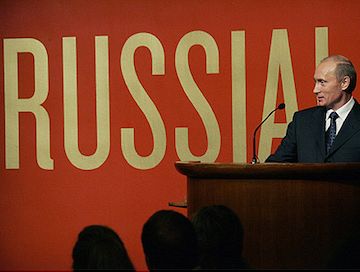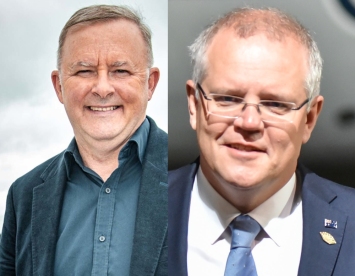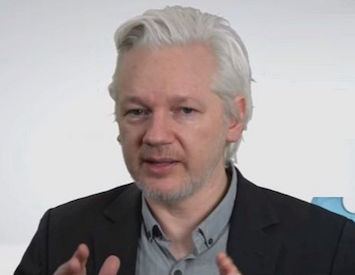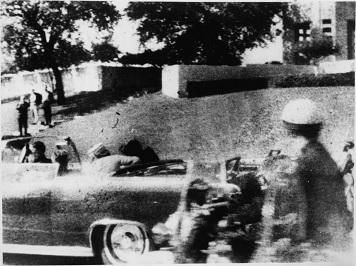James O'Neill critiques the Sydney Morning Herald's recent portrayal of Putin's Russia.
THE SYDNEY MORNING HERALD (SMH) used to be a respected broadsheet.
It moved to tabloid size and its journalism followed the same trajectory.
Nowadays, it is divided into four broad sections: news (of a highly selected nature); comment and analysis; business and sports. Other miscellany includes the weather, public notices, obituaries and the like.
It is almost impossible to trust the first two of these categories — so slanted, ill-informed or propagandistic is so much of their content. There are some honourable exceptions, but like mining for gold, an awful lot of dross has to be sifted to find the valuable nuggets.
The manifold problems with what the SMH is pleased to call “analysis” are exemplified by a piece in the SMH of 30 March 2017 by Helen Womack. It is entitled 'The genie of Russian youth threatening Vladimir Putin's "managed democracy'. We are told that Ms Womack was a Moscow correspondent for 30 years. A Google search revealed that those 30 years ended in 2015, so her time there covered the Gorbachev, Yeltsin, Medvedev and Putin years.
Putin's model of "managed democracy" may no longer work. https://t.co/owbddQCinD
— chris zappone (@chrizap) March 28, 2017
Quite what Ms Womack learned from her 30 years in Moscow is not entirely clear from her "analysis". It included the Yeltsin years, which were an unmitigated disaster for most Russians. Their living standards plummeted, life expectancy dropped and, apart from a select number of oligarchs, the principal beneficiaries of those years were the western capitalist conglomerates that plundered Russia for their own benefit. Ms Womack ignores this history but it is critical for putting what she later alleges in proper context.
Her failure to acknowledge the disastrous Yeltsin years means she is unable to attribute credit to subsequent Russian leaders – including but not only Putin – who have led Russia to a remarkable evolution, often in the face of hostility, misrepresentation and sabotage from the west.
Russia is not only the world’s largest country by a significant margin, it is large and diverse. It even encompasses a Jewish oblast, as well as accommodating a range of other faiths such as Russian Orthodox (41%) Muslim (6.5% and much higher in the Caucasus) and Christian (4.1%). More new Orthodox churches have opened under Putin than at any other time since the 1917 Bolshevik Revolution.
According to Ms Womack, Putin 'hates revolution and banks on a public desire for stability'.
He faces, according to Ms Womack, the
'... nightmare that his model of "managed democracy" may no longer work.'
Is there a single western leader to whom Ms Womack can point that loves revolution? Is there a single western community that does not desire stability? Yet, in Ms Womack’s view, these are somehow unique qualities that disadvantage Mr Putin. She claims that 'discontented youth' threaten Mr Putin’s ability to win another election.
Ms Womack clearly did not follow the results of the 2016 legislative election in Russia, nor is she cognisant of the results of multiple western-conducted opinion polls in Russia.
There are more than 100 registered political parties in Russia (more than in Australia for example). After the 2016 election, there were six parties in the Federal Parliament (Duma). Medvedev’s United Russia Party polled 54.2% of the vote (up from 49.3 in 2012) and holds 343 of the 450 available seats in the Duma. It was followed by the Communist Party (42 seats) LDPR (39 seats), A Just Russia (23 seats) and Rodina and Civic Platform (1 each). It is therefore at least as diverse as the Australian lower house.
Quite how "discontented youth" are a threat to Putin in the light of these results is unclear. Ms Womack cites two isolated instances of disaffected youths as somehow conveying a wider truth. According to opinion polls, Putin consistently scores in the 80%-plus approval category across all age groups. Lest anyone suggest the polls are as managed as Ms Womack claims Russian democracy is, the following are drawn only from polls conducted by American companies.
According to Pew Research, in a poll conducted in June 2015, Putin’s overall approval rating was 80%. When respondents were asked about his handling of relations with China, the U.S., Ukraine and the EU he scored 90.7%, 85%, 83% and 82% approval, respectively.
A Washington Post poll conducted on behalf of one of the world’s leading "Russophobic" outlets in March 2016, had Putin rated as “trustworthy” by 73% of those polled with 65% wanting him re-elected, compared to 57% a year earlier.
Gallup, another American pollster, had Putin’s approval rating at 86.1% in the last week of February 2017. This was an increase on earlier polls, that Gallup called an “uptick" and indicated this was "despite economic worries”.
Inconveniently Putin is insanely popular in Russia. He inherited a total mess https://t.co/thydDL8Ryn
— Arron Banks (@Arron_banks) April 2, 2017
Those are the sorts of approval ratings that other European, North American, and Australasian leaders can only dream about. Ms Womack completely ignores the objective evidence, perhaps because it does not fit her (and the SMH’s) narrative of a “beleaguered” leader beset by a youth revolt.
A similar blindness, historical amnesia and geopolitical ignorance mark Ms Womack’s description of Russia’s policies vis-à-vis Ukraine.
Ms Womack says:
'Ukraine ... is the root of the Kremlin’s problems. Spooked by mass protests in Kiev in 2014, Russia annexed Crimea and fomented war in Eastern Ukraine. Western sanctions allowed Kremlin propagandists to portray Russia as beleaguered ...'
If there is any single measure that is a litmus test of western media objectivity, it is surely the consistent misreporting of the events in the Ukraine and Crimea in 2014 and subsequently, including Russia’s policy responses.
Whether or not Russia was “spooked” by the events in 2014 is a moot point. They were certainly American-financed; a $5 billion organised coup overthrew the legitimate government of Ukraine and replaced it with a right wing cabal that draws inspiration and support from Nazi-oriented politicians. Ms Womack is in tune with other Western media in refusing to even acknowledge that the events in February 2014 in Kiev were a coup, even though it has been admitted as such by the Americans.
One of the many offensive policies that the Ukraine's Poroshenko regime instigated was the banning of the Russian language — even though that is the first language of a significant majority of Crimean and Eastern Ukraine citizens.
Crimea had been part of Russia since at least since Catherine the Great defeated the Ottomans in 1783. Australian troops also fought Russians in the Crimean War in the 1850s in an early attempt by the British to seize control of the important port of Sevastopol.
Crimea remained part of Russia until 1954, when Soviet leader Nikita Khrushchev and the Soviet Presidium “gifted” Crimea to Ukraine without consulting either the Crimean or the Russian people.
The Crimeans (and the residents of the Donbass region of Eastern Ukraine) were understandably upset at the February 2014 coup. A referendum was hastily organised and held on 16 March 2014. There was an 83% turnout and 96.7% voted in favour of applying to be readmitted to the Russian Federation.
The United Nations Charter recognises the right of people to self-determination — a principle the West was eager to embrace in the case of Kosovo but wishes to deny the Crimeans. None of this essential information is allowed to intrude upon Ms Womack’s narrative.
The argument that Russia “fomented war” in Ukraine is equally false. A majority of the people of Donbass wanted to join the Russian Federation, with whom they share linguistic, cultural and family ties. Russia refused their wish, a fact that the Western press goes to considerable lengths to conceal.
@Hermius1 @mark_markat Its Ukraine bombing Donbass,media silent!
— KG (@YSPHUK) January 31, 2017
As for “fomenting war”, it is the Ukrainian Government that is bombing and firing artillery shells and rockets into civilian areas of Donbass. Of course Russia supplies political and material support to their cultural brethren. They would be entitled to under the concept of Responsibility to Protect (R2P), were it not for the fact that this is a concept the West reserves to itself for the right to intervene when its own geopolitical goals demand.
It was Russia, along with France and Germany, that negotiated the Minsk Accords with Ukraine that set out a specific pathway to a peaceful resolution of the conflict in Eastern Ukraine that has become a civil war. It is the Ukrainian Government, however, who have refused to comply with the terms of the settlement to which they had agreed. That refusal has been criticised by France and Germany — another fact that the Australian media prefer not to publicise.
As to who is actually fomenting war, Ms Womack neglected to mention that U.S. Senators McCain and Graham travelled to Kiev after the 2016 U.S. presidential election and urged Ukraine to keep fighting, promising American support.
As to the sanctions making Russia “beleaguered”, again Ms Womack is apparently oblivious to a whole range of economic and geopolitical initiatives that Russia has taken in response to western sanctions, the main victims of which appear to be the people of Western Europe. One has only to mention the successful Russian intervention in Syria, the expansion of the Shanghai Cooperation Organisation and the huge development projects with China as part of the "One Belt, One Road" developments to note that Ms Womack, along with most of the SMH’s readers (one suspects), is simply ignorant.
SMH does its readers a disservice by promoting what is little more than ill-informed anti-Russian propaganda. It is little wonder that its readership is shrinking ever closer to the point of threatening its very existence. They have only themselves to blame.
James O'Neill is a former academic and has practiced as a barrister since 1984. He writes on geopolitical issues, with a special emphasis on international law and human rights. He may be contacted at joneill@qldbar.asn.au.

This work is licensed under a Creative Commons Attribution-NonCommercial-NoDerivs 3.0 Australia License
I saw this crap on BBC & think it's a good laugh
— The Greatest Freedom (@whattaa) December 30, 2016
Syria war: How Moscow’s bombing campaign has paid off for Putin - https://t.co/7lMlFaoqPg
Monthly Donation
Single Donation
Be informed. Subscribe to IA for just $5.











